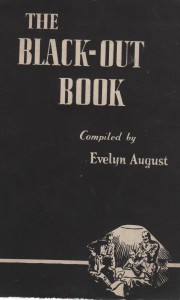 Found in The Black-Out Book (1939) are these rules copied out in her diary by the editor’s great-grandmother.
Found in The Black-Out Book (1939) are these rules copied out in her diary by the editor’s great-grandmother.
Good manners are made up of petty sacrifices
When calling, do not enter into grave discussion. Trifling subjects are better.
It is rude to turn a chair so that your back will presented to anyone.
In company do not converse with another in a language that is not understood by the rest.
If it becomes necessary to break a marriage engagement, it is best to do so by letter. The reasons for your course can be given much more clearly than in a personal interview. All presents, letters, etc., received should accompany the letter announcing the termination of the engagement.
During a walk in the country, when ascending a hill or walking on the bank of a stream, and the lady is fatigued, and sits upon the ground, a gentleman will not seat himself by her, but remain standing until she is rested sufficiently to proceed.
A dispute about religion is foolish. When it is known that there are fifteen hundred millions of people on the face of the earth, speaking 3034 languages, and possessing one thousand different religious beliefs, it will be easily seen that it is a hopeless task to harmonize them all. Continue reading




